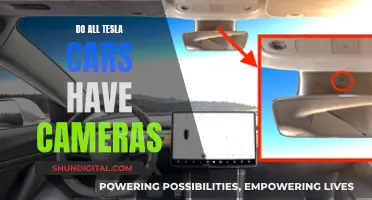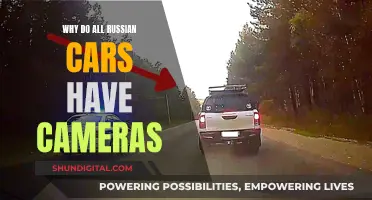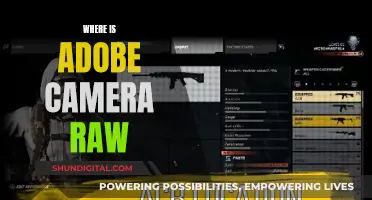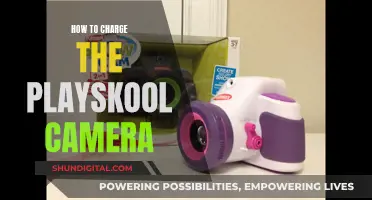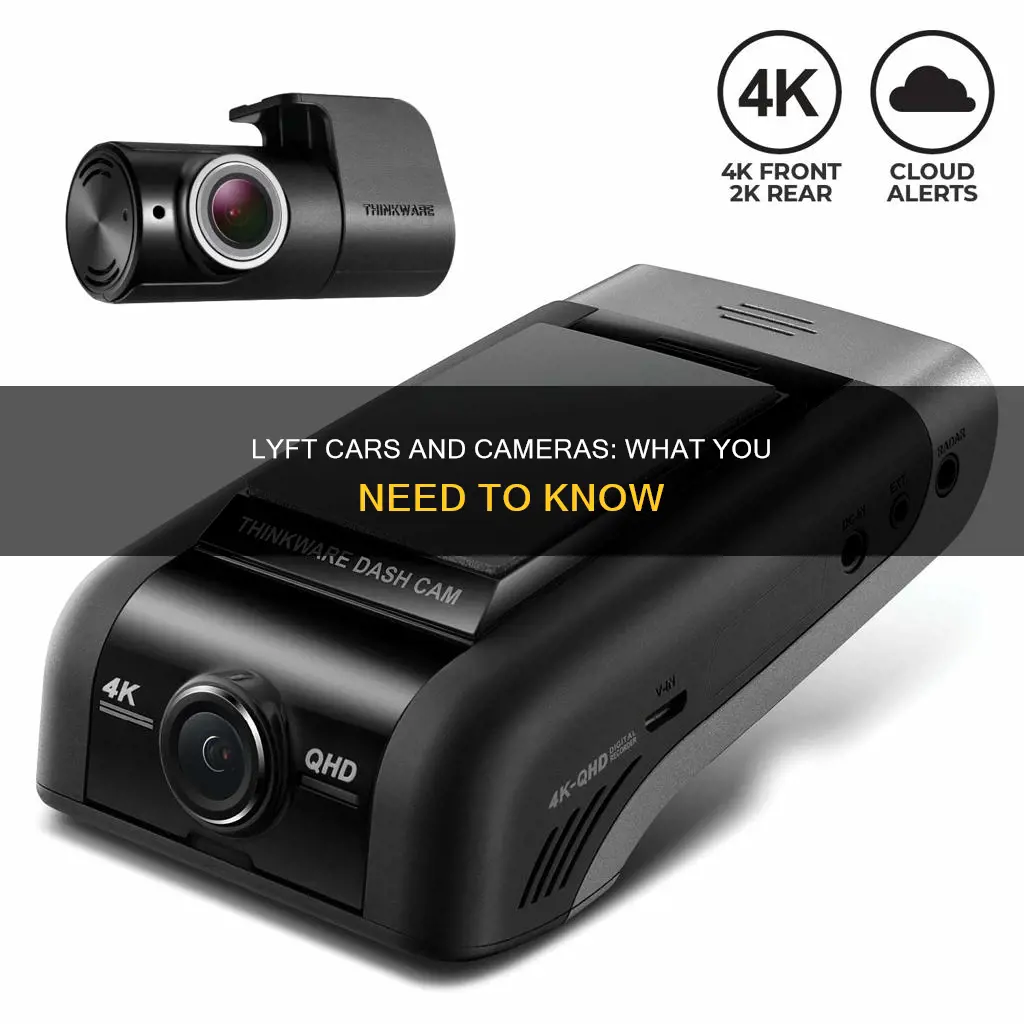
Lyft cars may have cameras, but this is not a requirement. Lyft allows its drivers to install and use video cameras, but they must comply with their city and state's regulations when it comes to recording devices. Some locations may not allow recording devices at all, while others may require signage. Lyft drivers can register their dashcam through the Lyft Driver app, but this is optional.
| Characteristics | Values |
|---|---|
| Lyft's policy on recording devices | Lyft asks its drivers to comply with their city and state's regulations when it comes to recording devices. Lyft also states that some locations may not allow recording devices at all, while others may require signage. |
| Lyft's policy on weapons | Lyft has a strict "No Weapons" policy for all of its properties. This includes Lyft Hubs and service centers. |
| Lyft's policy on smoking | Smoking inside Lyft cars is against community rules. |
What You'll Learn

Lyft's recording device policy
Lyfts Recording Device Policy
Lyft's policy on recording devices is primarily dictated by local regulations. Lyft instructs drivers to refer to their city and state's regulations on recording devices when giving rides. Lyft does not allow the broadcasting of another person's image or recording without their express prior consent and may result in the user's account being disabled.
Lyft drivers can register their dashcam through the Lyft Driver app. Lyft does not have direct access to the cameras, but they will know that a camera is in the vehicle once the driver completes the registration. Registering a dashcam is optional, but all drivers must follow the recording device policy at all times.
Lyft drivers are encouraged to protect themselves, record evidence in case of accidents or disputes, deter bad behavior from passengers, and capture unexpected moments on the road.
Local Regulations
Depending on local regulations, the use of dashboard cameras and other recording devices during rides may not be allowed. Some cities or states may require signage to make known the presence of recording devices, while other regions may not allow recording devices at all.
One-Party and Two-Party Consent States
In one-party consent states, only one person needs to consent to audio surveillance, and that one party is the driver. In two-party consent states, all parties must agree to be recorded. However, consent can be implied by continuing to talk even though the other party knows they are being recorded or talking in a public place where there is no "expectation of privacy".
Wired Lorex Cameras: How Long Do They Last?
You may want to see also

Local regulations on recording devices
In the US, there are 12 states that require all parties' consent to film or record a private conversation, such as would take place in an Uber or Lyft. These states are:
- California
- Connecticut
- Florida
- Illinois
- Maryland
- Massachusetts
- Montana
- New Hampshire
- Pennsylvania
- Washington
- Vermont
In these states, it is recommended that rideshare drivers post a decal or sticker alerting riders on all windows of the passenger seats. They should also use a dual-view camera to film both the vehicle's front view and inside view. If the camera has a solid or blinking light that passengers can see when filming, this can also indicate two-party consent.
In the remaining US states, only one party's consent is needed for recording, and this is often the driver. However, it is still recommended that passengers are made aware of recording through signage, oral notification, or in-app notifications.
In Canada, consent from all parties is required for audio recording in a private space.
In the UK, dashcams are allowed, but there are strict rules about audio recording. The footage cannot be shared publicly without consent, and it is not admissible in court.
Charging Camera Batteries: Overcharging and Its Effects
You may want to see also

Lyft's driver requirements
Lyft has several requirements that must be met before a person can drive for the company. These requirements vary depending on the city or state.
Age
The minimum age requirement to drive with Lyft is between 21 and 25 years old and varies by region.
Driving Experience
Drivers must have at least one year of licensed driving experience.
Driver's License
Drivers must have a current and valid driver's license. Temporary or out-of-state licenses are also acceptable.
Vehicle
Drivers must have a 4-door vehicle with a minimum of 5 seatbelts and a maximum of 8 seatbelts. The vehicle must be registered and insured, and some regions will require a vehicle inspection. Lyft's Express Drive program allows drivers to rent a car that meets these requirements if they do not have their own vehicle. Taxis, stretch limousines, and certain subcompact vehicles are not accepted on the Lyft platform.
Background Check
Lyft conducts a criminal background check as part of the application process. Drivers may be ineligible to drive for Lyft if their background check reveals certain offences, such as violent crimes, sexual offences, driving under the influence, fraud, drug-related offences, or theft.
Driving Record
Lyft requires an up-to-date DMV check and conducts continuous driving record monitoring of active drivers. Drivers may be disqualified if their driving record reveals an invalid license status, multiple moving violations, major moving violations, DUI, or serious driving-related convictions.
Community Safety Education Program
All Lyft drivers are required to complete the Community Safety Education program, developed in partnership with RAINN, to educate drivers about appropriate behaviour, challenging situations, and creating a safe and comfortable ride for everyone.
Recording Device Policy
Lyft allows the use of dashboard cameras and other recording devices during rides, depending on local regulations. Drivers must follow the recording device policy at all times, and broadcasting another person's image or recording without their express prior consent is prohibited.
Additional Requirements
Some cities and states may have additional requirements, such as in-state documents or specific age requirements. It is essential to review the requirements for your specific location before applying to become a Lyft driver.
Master Madden 10: Camera Angle Tricks
You may want to see also

Lyft's safety policies
Lyfts Safety Policies
Lyft has a range of safety policies in place to protect both drivers and passengers. These policies cover various aspects, from recording device protocols to underage riders and a strict "No Weapons" policy. Here is an overview of some of Lyft's safety measures:
Recording Devices
Lyft's policies regarding recording devices vary depending on local regulations. The use of dashboard cameras (dashcams) and other recording devices is permitted but subject to certain rules. In some cities or states, signage may be required to inform passengers of the presence of recording devices, while other regions may prohibit recording devices altogether. Lyft drivers are responsible for complying with the regulations of their specific location.
Lyft also has a strict policy against broadcasting another person's image or recording without their express prior consent. Violation of this policy may result in the disabling of the driver's account.
Underage Riders
Lyft has a policy in place to prevent underage riders from using the service unaccompanied. Passengers must be at least 18 years old to sign up for a Lyft account, and minors are not allowed to take Lyfts without an adult. If a driver believes a passenger might be underage, they are authorised to ask for age confirmation. Riders who receive multiple reports for appearing underage will be subject to an additional identity verification process. During this time, they will not be able to take rides until their verification document has been reviewed by a Lyft agent.
"No Weapons" Policy
Lyft enforces a strict "No Weapons" policy for all its properties, including Lyft Hubs and service centres. This policy also applies to drivers when they are driving for Lyft or visiting a Lyft Hub. Even in places where carrying a weapon is legal, Lyft asks that individuals refrain from doing so on any Lyft property. The presence of a weapon may distress other community members and compromise their sense of personal safety. Lyft reserves the right to determine what constitutes a "weapon," which may include items such as firearms, knives, stun guns, explosives, slingshots, and tasers.
Community Safety Education Program
In partnership with RAINN, the largest anti-sexual violence organisation in the US, Lyft has developed a Community Safety Education program. This program is mandatory for all Lyft drivers and aims to educate them about appropriate behaviour during rides. It empowers drivers to handle challenging situations and create a safe and comfortable environment for both themselves and their passengers.
Smoking Policy
Lyft has a strict no-smoking policy for its community. Smoking inside Lyft vehicles is prohibited to ensure respect for all passengers and prevent potential respiratory issues.
Computer Cameras: Just Like Regular Cameras?
You may want to see also

Lyft's stance on broadcasting recordings
Lyft allows its drivers to install and use video cameras, dash cams, or other recording devices, recognising their potential to enhance safety and provide evidence in case of accidents or disputes. However, Lyft also respects the privacy of its users and adheres to local regulations regarding the use of recording devices.
According to Lyft's policies, broadcasting another person's image or recording without their express prior consent is prohibited and may result in account deactivation. This stance aligns with the company's commitment to holding its community accountable for their actions and fostering a safe and respectful environment.
Lyft's policies on recording devices vary depending on local regulations. In some cities or states, signage may be required to make the presence of recording devices known, while other regions may prohibit recording devices altogether. Ultimately, drivers are responsible for complying with the regulations of their specific location.
Lyft's approach to broadcasting recordings is twofold: prioritising safety while also respecting privacy and adhering to local laws. This stance helps maintain a balanced and secure environment for all users of the platform.
Mastering Double Focus Photography: Capturing Two Perspectives
You may want to see also
Frequently asked questions
Lyft does not require drivers to have cameras in their cars. However, Lyft allows drivers to install and use video cameras, dash cams, or other recording devices to record riders for purposes of safety.
Yes, you can refuse a ride in a Lyft car with a camera if you have privacy concerns.
Yes, you can ask a Lyft driver to turn off their camera, but the driver may or may not choose to honor this request.
Yes, you can ask a Lyft driver to inform you if they have a camera. Lyft drivers are required to comply with their city and state's regulations when it comes to recording devices.



